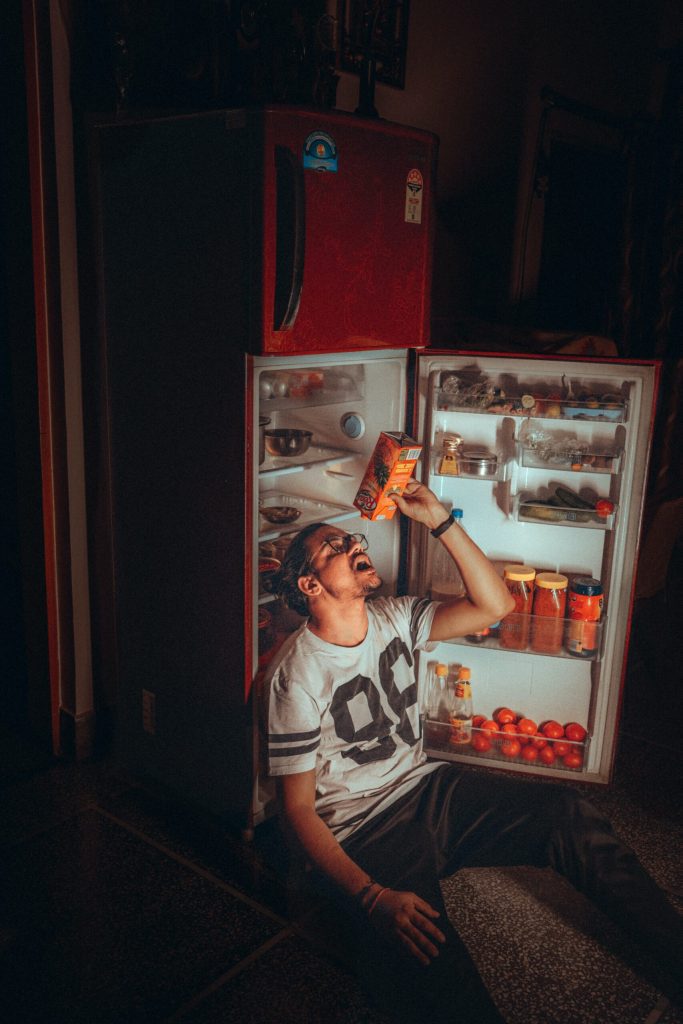Do you often find yourself hungry at night and unsure what to do about it?
You must be wondering what’s driving this habit?
Is this going to make me gain weight?
Is it okay if I go to bed hungry, or should I eat something first?
These are just some of the questions you might be asking. What are you supposed to do about it? Let’s dive in.
Why am I hungry before going to bed?
The obvious answer here is that you didn’t get enough calories during the day; however, other reasons might include:
- Lack of sleep: Surprise! You can’t go to bed because you’re hungry, but you’re hungry because you lack sleep. Hormones that influence the feeling of hunger and fullness are heavily affected by the amount of sleep we get, thus increasing appetite.

- Certain medications: Medications for epilepsy, antidepressants, and corticosteroids may increase appetite, and some might cause you to feel hungrier in the evening.
- Medical conditions: Night eating syndrome (NES) is when a person wakes up at night to eat and can’t go back to sleep without eating.
- You were extra active physically: You might need more calories than you usually consume if you did more physically demanding activities.
- Your menstrual cycle: According to this study, there is a small but significant increase in the resting metabolism in the luteal phase.
Why am I so hungry at night but not in the morning?
There are reports that leptin levels (the hormone that tells us we’re full) could be higher in the morning, while the hunger hormone ghrelin (which tells us we’re hungry) is usually lower.
It’s also possible that you’ve been busy at work, which distracts you from feeling hungry or eating, and you only notice that in the evening because it’s quiet and you’re not preoccupied with things to do.
Should I eat if I’m hungry at night?
First, I’d like to reiterate that each situation is different.
There will be days when you have to eat before bedtime and some days when it’s okay not to eat.
There are days when you’re not hungry, but you’re just craving something, like chocolate, ice cream, or other desserts.
If you’re worried that you will gain weight, remember that gaining weight has nothing to do with when you eat but more about calorie consumption and use.
If you feel like eating late at night but still within your calorie requirement for the day, there’s no great cause for concern.
What if I’m too hungry to sleep?
Going to bed hungry will be a problem if this prevents you from relaxing and getting sleep; however, it is usually considered okay if you’re getting enough nutrition and calories for the day.
Several things can happen if you go to bed hungry:
- A constantly growling stomach might prevent you from getting a good night’s sleep
- You might wake up the next day tired and cranky
- Since you didn’t get enough sleep, you might need to consume more calories or caffeine the following day
- Drinking too much caffeine might interfere with sleep
- If you need to eat more to give you energy and compensate for the lack of sleep, you might gain weight
- Your body might metabolize your available muscle while you’re sleeping if you’re not consuming enough calories
- Your insulin level might drop, and it could help you lose weight
If you’re too hungry to sleep, don’t be afraid to eat something, preferably high in protein, not only because it promotes muscle recovery but also because sleep quality is typically unaffected by pre-bed protein consumption.

Try to avoid those which might interrupt your sleep. Fatty and spicy foods might cause inconvenience when consumed too close to bedtime, interfere with your sleep, and wake you up in the middle of the night.
How to stop hunger at night
1. Identify why you’re hungry at night
First question, did you consume enough calories during the day? If not, this is also a probable reason you’re eating a lot in the evening. If you’re not sure, there are plenty of apps that can help you track your calorie intake.
(and if you want to know how many calories you need to burn fat, maintain weight, or put on weight, the Jacked vegan’s calorie calculator can help you with it).
Do you habitually eat late at night while watching TV?
Are you eating at night even though you’re not hungry? Do you wake up in the middle of the night and need to eat something to get back to sleep? If yes, this could be a sign of an eating disorder, and I suggest you consult with a professional for proper diagnosis.
2. What triggers the behavior?
If you have an idea why you usually eat late at night, you can plan for it.
If you consistently eat chips while watching TV in the evening, perhaps you can watch somewhere you cannot bring food (like your bedroom).
And if you’re consistently skipping your meals, leaving you hungry in the evening, maybe this next tip can help.
3. Eat frequently
If you’re swamped with work, causing you to skip meals and eat the bulk of your calories in the evening, then having fixed times when to eat might help. Eating frequent, small meals helps keep your blood sugar stable throughout the day.
Even if you’re not hungry, eating something like an apple or banana for breakfast will help keep your blood sugar stable, so you don’t feel famished and eat a feast late in the evening.
4. Have plenty of healthy snacks available
If you’re going to eat frequently, you’ll need to eat snacks between meals.
The best snacks to munch on between meals would be those that can keep you full while providing nutrients such as fruits, a protein shake, smoothies, nuts, or toast with peanut butter.
Here’s a list of excellent vegan snacks you can eat.
5. Eat plenty of whole foods
Carbs like bread and pasta are easily digested and would leave you craving for more. Instead, eat a diet filled with protein from tofu, beans, and other legumes. Eat plenty of fibrous carbs from vegetables and fruits because whole foods’ fiber and protein content take longer to digest and can help keep you full longer.
The more whole foods you eat, the longer you can get by without eating.
6. Eat a filling dinner
The people who eat again after dinner are probably those that didn’t eat enough. They eat little because they’re concerned that overeating late at night might cause weight gain. But then, they don’t consume enough calories and end up hungry after dinner and troop to the fridge after.

Eating too little will cause challenges, just as overeating late at night will.
7. Eat a filling snack at night
It’s normal to feel hungrier than usual. There are plenty of factors that could influence this. Maybe you were extra active physically that day or during your menstrual cycle.
If that’s the case, don’t be ashamed to go to the fridge and eat something if you’re hungry before going to bed. Eating vegan greek yogurt with fruits, nuts, or a toast with peanut butter is excellent. They’re healthy, filling, and won’t interfere with your sleep.
That’s better than reaching for a vegan burger and fries late in the evening.
8. Look for different ways to relax
Most of the time, people turn to food for comfort when they’re sad, frustrated, or stressed. It’s easier to be more aware of these feelings in the evening when we’re alone, and there are fewer distractions.
Instead of eating at night to overcome these negative emotions, you can walk your dog, take a warm bath, run, call a friend or family member you’ve wanted to talk to or watch a funny movie. These are also great activities to do when you get bored.
9. Look for something to do
This is sort of connected to the previous point.
If you’re not preoccupied, then there’s a chance that boredom and thought of food will enter your mind. Learning a new skill, getting a new hobby, or reading a book can help keep you busy and prevent eating late at night.
10. Go to bed early
And lastly, going to bed early can help prevent you from consuming more calories than you need.
Going to bed early means less time for you to eat. When you get seven to eight hours of sleep, you’ll feel more refreshed the following day, and you would have a better chance to take the day on without having to reach for an extra cup of coffee or sweets to get you going.
Sleeping ~6 hours instead of 8 hours a day for just four days can increase energy intake by 20%.
Try any of these tips
Now that you know why you’re hungry at night, pick any of these tips and try them.
Identify what’s causing your habit of eating late at night.
Don’t blame yourself if you need to eat more in the evening.
Be prepared with healthy snacks.
Stock up on whole foods.
Experiment with these tips and see which one gives you the best results.





